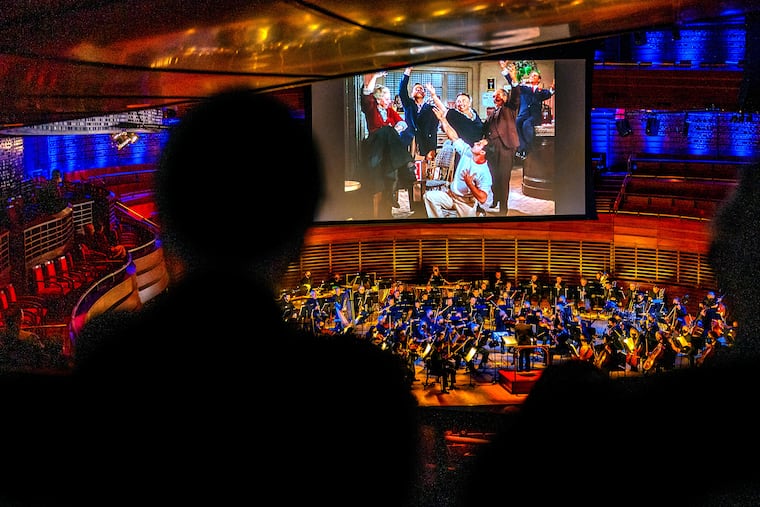Philadelphia Orchestra breathes new life into ‘An American in Paris’ screening
The Philadelphians, playing live to the 1951 Hollywood musical film, were a rare thrill.

The conversation between film and music is real and deep, and more than a few synergistic sparks were sent flying Thursday night in the Philadelphia Orchestra’s live-to-screen presentation of An American in Paris.
The most remarkable aspect of this show, though, was the number of times the music saved the movie. It’s not a uniformly great film. Parisian culture comes across as canned. The dialogue can be corny. The success of the film and its ranking as a high-water mark among Hollywood musicals largely relies on the gymnastic charisma of Gene Kelly and the turn-on-a-dime pout and radiance of Leslie Caron.
But time and time again Thursday it was possible — advisable, really — to turn your eyes away from the screen above Verizon Hall’s stage and once again marvel at what a great Gershwin ensemble this orchestra is. Plush strings and colorful, sinewy winds filled out emotion and characterization the writers of the 1951 film sometimes failed to do. The Philadelphia Orchestra, it turns out, has a roar more powerful than the MGM lion.
The Gershwin brothers get the credit for the music and lyrics, and rightly so. The film brings back a patchwork of George Gershwin tunes, all from decades earlier (Gershwin died in 1937), and, interestingly, the film’s namesake 20-minute score never appears in unadulterated form — not even in the famous ballet sequence near the end. And yet the two-hour film’s music is nearly wall to wall. The creation of transitional material, as well as sections that take off on material from the original An American in Paris orchestral piece, fell to composers Johnny Green and Saul Chaplin, and it’s their efforts that make this film ideal for today’s live-to-screen orchestra format.
The orchestra, expertly led here by conductor Ludovic Morlot, jumped to the fore in the opening scene introducing Jerry Mulligan, the Gene Kelly character who’s an American artist struggling in Paris, and his pal Adam Cook, the would-be concert pianist played by real-life pianist Oscar Levant. These aren’t the sequences saved by the orchestra, though. The vapid cafe scene flavored by Strauss, so cringey when seen on screen alone, became something more with live orchestra. Violinists David Kim and Marc Rovetti were a lovely presence, and bold writing for the horns made for an almost three-dimensional experience.
The Philadelphians were augmented with jazz-band elements that included five sax players, drum set, and guitar, and the two genres melded beautifully.
Opening night of the orchestra’s latest film concert drew an audience of only just above 500, and you couldn’t help lamenting what the absent couple of thousand were missing. To have a live orchestra so present, and this one in particular so expert, is a rare thrill. The film’s high point alone made it worth hearing. In “Love is Here to Stay,” when Kelly and Caron are by the Seine, Kelly sings. Warm strings are followed by touching woodwinds, horn player Jennifer Montone and violinist David Kim have solos of penetrating intimacy, and harpist Elizabeth Hainen lays out the lights of Paris. The focus is gauzy, the contours of the orchestra soft, and life is good.
Additional performances Fridayat 2 p.m. and Saturday at 8 p.m. in Verizon Hall, Broad and Spruce Sts. Tickets are $10-$90. The orchestra’s next live-to-screen movie presentation is “The Princess Bride,” Feb. 25 and 26, with David Newman conducting. philorch.org, 215-893-1999.